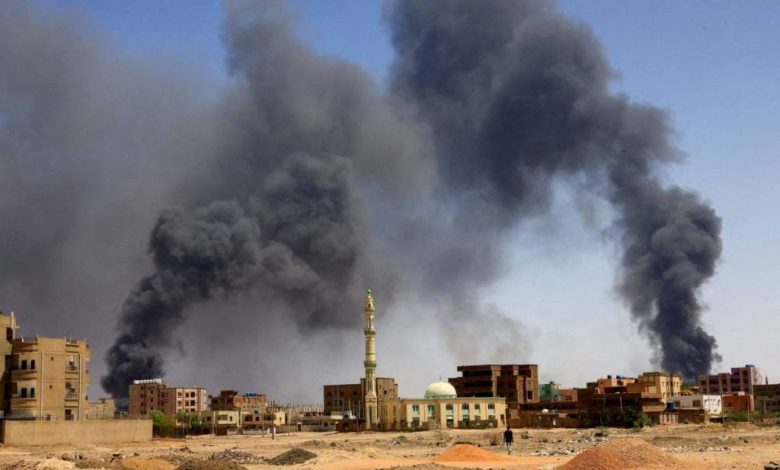Reports
How Has the Sudan Crisis Affected Its Relations with Neighboring Countries?

Sudan Events – Agencies
Nineteen months into the conflict between the Sudanese Armed Forces and the Rapid Support Forces (RSF), Sudan’s turbulent relations with some neighboring countries are showing signs of recovery. This shift comes as Sudan opens direct channels of communication following reassessments of stances driven by internal and external factors.
Diplomatic and security sources revealed to Al Jazeera Net that some neighboring countries had interests aligned with RSF leader Mohamed Hamdan Dagalo (Hemetti) and other influential entities, while others misjudged the war’s trajectory, adopting positions against Sudan’s government or remaining neutral.
However, both Egypt and Eritrea have consistently supported Sudan’s “legitimacy and constitutional institutions” since the conflict began, actively promoting stability and peaceful solutions, according to the same sources.
Sudan’s Director of General Intelligence Ahmed Ibrahim Mufaddal has recently toured countries including the Central African Republic (CAR), Ethiopia, and Libya, successfully opening channels of dialogue on critical issues, resulting in shifts in these nations’ stances.
Sudan’s Sovereign Council Chairman, Abdel Fattah al-Burhan, stated during the Port Sudan Economic Conference in November that Sudan’s alliances and dealings will be shaped by the outcomes of the ongoing war. He emphasized that those who supported Sudan would be treated as friends, while those who wavered would be treated accordingly, asserting that the war revealed true allies and adversaries.
Eritrea: A Gesture of Gratitude
Eritrean President Isaias Afwerki has maintained a supportive stance toward Sudan, welcoming Sudanese refugees without requiring identification, offering them free residence and healthcare, and rejecting refugee camps in favor of state-sponsored shelters.
Afwerki described this as a “gesture of gratitude” to the Sudanese people, who sheltered Eritrean refugees during their independence struggle. The president himself lived in Sudan during his leadership of Eritrea’s armed liberation movement.
In a recent interview, Afwerki criticized external interference in Sudan through neighboring countries such as Libya, Chad, and South Sudan. He also warned that Eritrea would intervene should the war threaten eastern Sudan’s states or regions like the Blue Nile.
Central African Republic: Balancing Interests
Reports indicate that CAR’s government controls only half its territory, while armed groups dominate the rest, facilitating RSF’s operations. The Russian paramilitary group Wagner acted as a bridge between Hemetti and CAR President Faustin-Archange Touadéra, supplying the RSF with weapons in exchange for Darfur-mined gold.
Recent diplomatic efforts, including meetings between Burhan and Touadéra, have softened CAR’s stance. According to Africa Intelligence, both sides agreed on closer cooperation, with Touadéra tasking aides to coordinate security matters with Sudan’s intelligence service.
Sudan, in return, agreed to assist CAR in capturing two rebel leaders accused of war crimes who had been operating from Sudan. This move aligns with both countries’ shared goals of curbing RSF influence and securing their borders.
Egypt: Deepening Cooperation
Egypt has deepened its engagement with Sudan, driven by shared national security concerns. Cairo has supported Sudan’s constitutional legitimacy, facilitated peace talks, and expanded trade to compensate for the destruction of Sudanese industries.
Egyptian Foreign Minister Badr Abdel Ati emphasized during his visit to Port Sudan that Cairo seeks to lift Sudan’s suspension from the African Union. Official sources also highlighted Egypt’s diplomatic efforts in rallying international and regional support for Sudan.
Libya: Divided Loyalties
Sudan faces challenges in dealing with Libya, where the situation is divided. The Tripoli-based government under Abdul Hamid Dbeibeh has shown willingness to collaborate, but eastern Libya’s leader, Khalifa Haftar, has supported the RSF.
UN reports accuse Haftar’s forces of supplying the RSF with weapons and mercenaries. Sudan provided documented evidence to Haftar, pressuring him to halt logistical support to Hemetti, including seizing Libyan snipers fighting alongside the RSF.
Ethiopia: Shifting Stances
Ethiopian Prime Minister Abiy Ahmed initially adopted a critical stance, suggesting a no-fly zone over Sudan and questioning its leadership vacuum. However, the escalating war and its proximity to Ethiopia’s borders prompted a recalibration. Abiy visited Burhan in Port Sudan in July, marking a turning point in bilateral relations toward stability and cooperation.
Chad: A Complex Relationship
Chad initially backed Sudan’s military, with President Mahamat Idriss Déby visiting refugee camps and offering support. However, Chad later became a hub for RSF military and logistical operations, prompting accusations from Sudanese officials.
Déby’s shift reportedly stems from financial incentives and investments, despite domestic opposition to his stance. Diplomatic tensions escalated, culminating in mutual expulsions of diplomats. Sudan demands concrete steps from Chad to curb RSF arms transfers before restoring full relations.
South Sudan: Consistent Support
South Sudanese President Salva Kiir remains steadfast in supporting Sudan’s military, refusing external pressures to back the RSF. However, elements within Kiir’s government allegedly facilitated arms transfers to the RSF, exploiting economic ties with Hemetti.
Nonetheless, both nations are working to resolve technical and security issues affecting oil exports from South Sudan via Sudanese territory. Burhan’s recent visit to Juba underscores efforts to bolster mutual security and economic collaboration.
The crisis in Sudan has exposed complex dynamics with its neighbors, reflecting a mix of historical ties, geopolitical interests, and shifting alliances. These evolving relationships will likely shape the region’s stability in the coming years.



